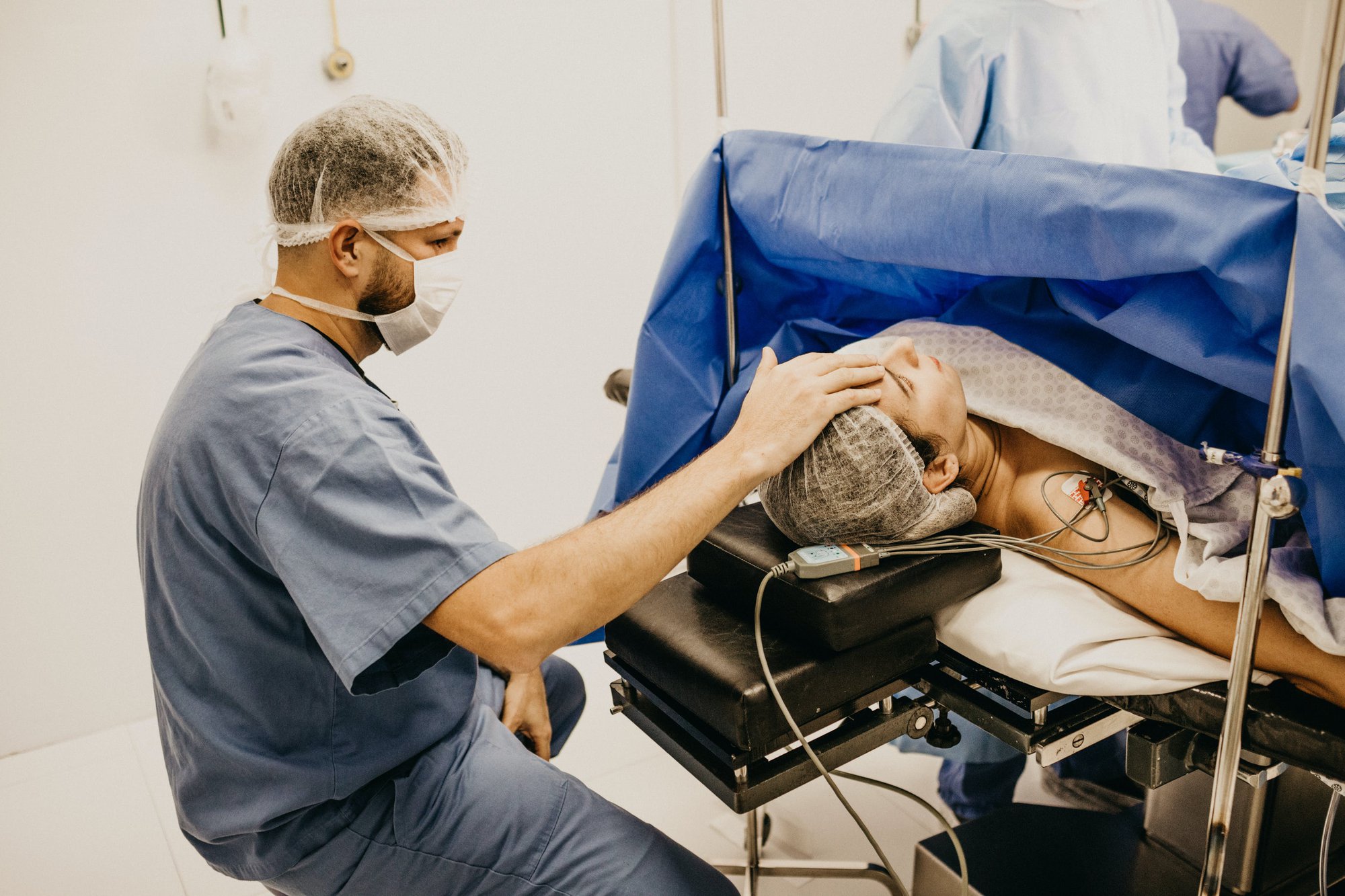Nurse Anesthetist Salary: How Much Do They Earn in Each State & Compared to Other Careers?

A nurse anesthetist is an advanced practice nurse (APRN) who plays a crucial role in the healthcare ecosystem. It’s a career track that invariably comes with a tremendous amount of responsibility, but working as a certified registered nurse anesthetist (CRNA) certainly has its perks.
From professional satisfaction to personal fulfillment to increased financial stability, putting in the effort to become an advanced practice nurse is well worth it. APRNs generally earn considerably higher salaries than other nurses and nurse anesthetists are top earners. However, you may not know the details about the role, and we are here to help. How much do CRNAs make, which states are the best to work in, from the perspective of your prospective earnings, and how much demand is there for nurse anesthetists?
We will answer all your questions about the current standard nurse anesthetist salary:
At a Glance: Nurse Anesthetist Salary vs. Other Nursing Careers
Let’s take a quick look at different career tracks for nurses and their corresponding salaries:
|
Nursing Careers |
Nurse Salaries per Year |
Required Degree |
|
Nurse Anesthetist |
$214,200 |
Doctorate (from 2025) |
|
Psychiatric-Mental Health Nurse |
$138,518 |
|
|
Nurse Midwife |
$131,570 |
MSN (including MSN FNP) |
|
Nurse Practitioner |
$128,490 |
MSN (including MSN FNP) |
|
Registered Nurse |
$94,480 |
ADN (least required), BSN (preferred) |
|
Nurse Educator |
$86,530 |
To see a complete comparison that includes more nursing roles and accounts for the area you reside and may work in, read our nurse salary by state report. You can also find out more about the estimated salary for other roles across the US:
The first step in pursuing the career of a certified registered nurse anesthetist is achieving or advancing to a BSN level of education. At Nightingale, you can do so via two different academic programs:
- BSN Program – Ideal if you are starting with zero experience and want to reach BSN-level education in the most accessible and flexible way. You will be attending online theoretical instruction that is concept-based and aims to develop the cognitive apprenticeship required by your future practice. Additionally, you will also complete your obligatory supervised on-ground field experiences (SOFE) in the settings that are most accessible to you. The program can be completed in less than 3 years.
- RN-to-BSN Track – If you have previously completed ADN or ASN degrees and obtained your RN licensure, you can further your education within just 1 year via a fully online advancement program. The option is not only short and accessible but is also designed with the well-being of your career in mind, being the ideal way to advance your nursing skills and improve healthcare delivery.
Choose the academic program that is best for you and get the nursing career you desire!

How Much Does a Nurse Anesthetist Make?
In the nursing world, it’s no secret that nurse anesthetists are the best-compensated nurses. According to the most recent data from the Bureau of Labor Statistics (BLS), the yearly average salary for CRNAs was $212,650.
Of course, as far as nurse anesthetists’ salaries go, various factors come into play. Specializing in a particular area of anesthesia, such as neuro-anesthesia, can lead to higher wages. However, geography also matters. Here is how much the average nurse anesthetist salary differs from the highest to the lowest paying states.
States with the Highest Nurse Anesthetist Salary
As a nurse anesthetist, you will earn the highest wages in Illinois – an annual mean salary of $281,240. Massachusetts comes in second, with CRNAs taking home around $272,510 annually. In Montana, CRNAs earn, on average, $256,460 per year, while in New York, nurse anesthetists earn about $256,160. Vermont is fifth among the top-paying states for CRNAs, with an average salary of $254,790.
States with the Lowest Nurse Anesthetist Salary
The state where nurse anesthetists earn the least money is Utah, with an average salary of $125,890 per year, followed by Alabama, with a median salary of $173,370, Florida, where they earn around $176,950, Idaho and Kansas, where CRNAs earn $178,600 and $184,650, respectively.
If your state is neither at the top nor the bottom regarding nurse anesthetist salaries, but you are still curious about your earning potential, we have you covered. Find below a list of all the states for which official BLS data was available and discover both annual and hourly salaries for CRNAs all over the United States:
Average Nurse Anesthetist Salary by State (2024)
|
State |
Nurse Anesthetist Salary |
Nurse Anesthetist Salary (Adjusted to Cost of Living ) |
|
Alabama |
$173,370 |
$196,342 |
|
Alaska |
- |
- |
|
Arizona |
- |
- |
|
Arkansas |
- |
- |
|
California |
$250,920 |
$181,170 |
|
Colorado |
$215,870 |
$205,395 |
|
Connecticut |
$247,740 |
$219,628 |
|
Delaware |
$207,030 |
$204,777 |
|
District of Columbia |
- |
- |
|
Florida |
$176,950 |
$175,720 |
|
Georgia |
$204,070 |
$224,747 |
|
Hawaii |
- |
- |
|
Idaho |
$178,600 |
$181,136 |
|
Illinois |
$281,240 |
$305,364 |
|
Indiana |
$207,180 |
$227,670 |
|
Iowa |
$227,710 |
$252,171 |
|
Kansas |
$184,650 |
$211,998 |
|
Kentucky |
$185,630 |
$201,772 |
|
Louisiana |
$218,770 |
$240,407 |
|
Maine |
$227,270 |
$206,797 |
|
Maryland |
$187,420 |
$160,876 |
|
Massachusetts |
$272,510 |
$186,014 |
|
Michigan |
$219,050 |
$241,777 |
|
Minnesota |
$221,650 |
$235,547 |
|
Mississippi |
$201,280 |
$233,233 |
|
Missouri |
$230,470 |
$260,418 |
|
Montana |
$256,460 |
$249,232 |
|
Nebraska |
$212,860 |
$234,169 |
|
Nevada |
- |
- |
|
New Hampshire |
$239,630 |
$210,018 |
|
New Jersey |
$252,130 |
$221,361 |
|
New Mexico |
$212,950 |
$226,543 |
|
New York |
$256,160 |
$203,463 |
|
North Carolina |
$222,560 |
$233,536 |
|
North Dakota |
$234,950 |
$248,362 |
|
Ohio |
$210,760 |
$222,555 |
|
Oklahoma |
$208,410 |
$241,775 |
|
Oregon |
$215,260 |
$187,672 |
|
Pennsylvania |
$209,890 |
$219,550 |
|
Rhode Island |
- |
- |
|
South Carolina |
$233,920 |
$245,456 |
|
South Dakota |
$211,090 |
$228,452 |
|
Tennessee |
$194,790 |
$215,714 |
|
Texas |
$216,280 |
$233,312 |
|
Utah |
$125,890 |
$121,986 |
|
Vermont |
$254,790 |
$220,980 |
|
Virginia |
$232,250 |
$227,920 |
|
Washington |
$246,350 |
$212,371 |
|
West Virginia |
$232,410 |
$265,006 |
|
Wisconsin |
$247,160 |
$259,895 |
|
Wyoming |
$228,780 |
$247,597 |
The data was taken from the Bureau of Labour Statistics. In some states, the salary estimates had either not been released or otherwise collected.

What Is a Nurse Anesthetist?
Nurse anesthetists are APRNs whose duties range from administering anesthesia and monitoring vital signs to providing care before, during, and after medical procedures. As a CRNA, your job starts way before the patient is on the operating table.
Safely administering anesthesia starts with knowing your patient’s medical history. Therefore, before a procedure begins, the nurse anesthetist must gather crucial information, like what medications the patient is taking, their allergies, and other illnesses the patient might have.
Only after that process can CRNAs give patients anesthesia: either general, putting the patient to sleep so that they don’t feel any pain during the procedure, or regional (local) anesthesia, to numb a particular area. The role of nurse anesthetists is equally essential during the operation. They continuously monitor the patient’s vitals to make sure they respond to anesthetics appropriately and, if necessary, adjust the anesthesia.
To successfully fulfill these duties, as an aspiring nurse anesthetist, you must possess a few crucial qualities. First off, one must be highly detail-oriented – every little element plays a role in choosing the proper anesthetic or the correct dosage. CRNAs must also be fast thinkers. They must make decisions on the spot if they sense that patients are not responding well to the anesthesia – there is no time to second-guess yourself. They need to be motivated, dedicated, and, equally important, they need to be empathetic. To a certain extent, people entrust nurse anesthetists with their lives, and that’s an obligation that must be treated with care and responsibility.
How to Become a Nurse Anesthetist?
Becoming a nurse anesthetist is longer and more complex than a registered nurse. It’s relatively easy for an RN to find employment with a BSN, ADN, or even an ASN degree. However, for aspiring nurses who wish to pursue APRN roles, a Master’s Degree in Nursing (MSN) is a requirement, and, in the near future, so will a Doctorate.
Nurses must be licensed in the state they choose to work in and need to pass a national certification exam to be able to practice.
The very first step is getting a bachelor’s degree in nursing, and depending on your previous educational background, it takes two to four years to complete. With a BSN and a few years of experience in a medical setting, you can start pursuing your dream of becoming a CRNA.
Typically, Master’s programs take around two years to complete, so, all in all, becoming a nurse anesthetist used to take about six or seven years. However, according to a recent change, by 2025, all new CRNAs will need to hold a doctoral degree to practice, and the qualifying programs will offer a doctor of nursing practice (DNP) degree. This can add up to two more years of studying.
Learn more about how long nursing school is, including how to choose the most efficient route for you.
At Nightingale College, we firmly believe in advancing your education as the best way to boost your professional performance and elevate the future of healthcare. That’s why we encourage aspiring nurses to follow their dream careers, which is why we offer the most reliable jumping-off point to start this journey. Our 100% online RN-to-BSN Track and hybrid BSN program are great ways to start climbing the academic and professional ladder to becoming a nurse anesthetist.
Enroll in our hybrid BSN Program or the entirely online RN-to-BSN Track, and you’ll be one step closer to your dream job!

How Promising Is the Job Outlook for CRNAs?
Because of the high demand for nurses, the nursing field, in general, is excellent in terms of job outlook. Employment is on the rise, and so are wages. Things are particularly good for advanced practice registered nurses. According to the BLS, employment of nurse anesthetists, nurse midwives, and nurse practitioners is expected to increase by 40%. This projected growth is considerably higher than that of other healthcare diagnosing or treating practitioners (9%), in general, and the projected increase of employment in all occupations (4%).
By 2033, a projected 5,200 new job openings will be available for nurse anesthetists joining the workforce, which amounts to a net 10% increase. The highest demand will occur in inner cities and rural areas. On average, there are around 31,900 openings for CRNAs every year.
Where Do Nurse Anesthetists Work?
Most certified registered nurse anesthetists work full-time. They can be employed in different settings, but most, almost 49.76%, work in physicians’ offices. Another 28.88% work in surgical and medical hospitals. Smaller numbers also find employment in the offices of other health practitioners (5.40%), outpatient care centers (4.77%), and academic settings (1.80%).
Work Settings with the Highest Earning Potential
Although they provide employment for a relatively small percentage of all nurse anesthetists, outpatient care centers represent top-paying work settings, with a median salary of $263,960 per year. These are followed by general medical and surgical hospitals, where the median pay is $230,150 per year. Specialty hospitals come in third, with an annual salary of $229,980, followed by home health care services and offices of physicians, where the median annual salaries are $216,040 and $207,630, respectively.

Ready to Become a Nurse Anesthetist?
The path toward a higher paycheck starts with furthering your education. Becoming a certified registered nurse anesthetist is a wise career choice: salaries are high, demand is increasing, and the impact you have on your patients’ well-being and the healthcare system, in general, is undeniable.
The journey of a thousand miles starts with a single step. Are you ready to take yours?
Your dream of becoming a nurse anesthetist is within your reach. Enroll in our hybrid BSN Program or the online RN-to-BSN program, and take the first step toward getting the APRN career you dream of!

